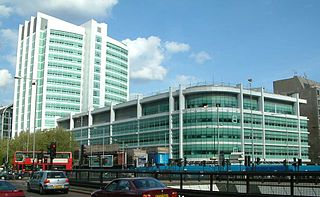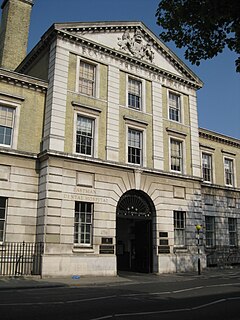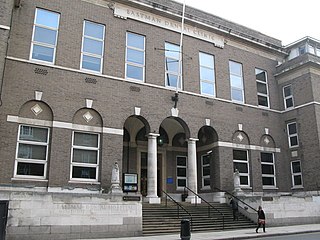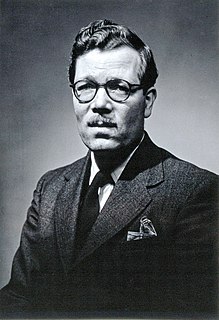Related Research Articles
University College London, which operates as UCL, is a public research university in London, United Kingdom. It is a member institution of the federal University of London, and is the second-largest university in the United Kingdom by total enrolment and the largest by postgraduate enrolment.

Euston Road is a road in Central London that runs from Marylebone Road to King's Cross. The route is part of the London Inner Ring Road and forms part of the London congestion charge zone boundary. It is named after Euston Hall, the family seat of the Dukes of Grafton, who had become major property owners in the area during the mid-19th century.

The UCL School of Pharmacy is the pharmacy school of University College London (UCL). The School forms part of UCL's Faculty of Life Sciences and is located in London, United Kingdom.

University College Hospital (UCH) is a teaching hospital in the Fitzrovia area of the London Borough of Camden, England. The hospital, which was founded as the North London Hospital in 1834, is closely associated with University College London (UCL), whose main campus is situated next door. The hospital is part of the University College London Hospitals NHS Foundation Trust

The Wellcome Trust is a charitable foundation focused on health research based in London, in the United Kingdom. It was established in 1936 with legacies from the pharmaceutical magnate Henry Wellcome to fund research to improve human and animal health. The aim of the Trust is to "support science to solve the urgent health challenges facing everyone." It had a financial endowment of £29.1 billion in 2020, making it the fourth wealthiest charitable foundation in the world. In 2012, the Wellcome Trust was described by the Financial Times as the United Kingdom's largest provider of non-governmental funding for scientific research, and one of the largest providers in the world. According to their annual report, the Wellcome Trust spent GBP £1.1Bn on charitable activities across their 2019/2020 financial year. According to the OECD, the Wellcome Trust's financing for 2019 development increased by 22% to US$327 million.

The Wellcome Library is founded on the collection formed by Sir Henry Wellcome (1853–1936), whose personal wealth allowed him to create one of the most ambitious collections of the 20th century. Henry Wellcome's interest was the history of medicine in a broad sense and included subjects such as alchemy or witchcraft, but also anthropology and ethnography. Since Henry Wellcome's death in 1936, the Wellcome Trust has been responsible for maintaining the Library's collection and funding its acquisitions. The library is free and open to the public.

The Institute of Psychiatry, Psychology and Neuroscience (IoPPN) is a research institution dedicated to discovering what causes mental illness and diseases of the brain. In addition, its aim is to help identify new treatments for them and ways to prevent them in the first place. The IoPPN is a faculty of King's College London, England, previously known as the Institute of Psychiatry (IoP).

The Eastman Dental Hospital was based on Gray's Inn Road until it co-located with the University College London ear, nose, throat, balance and hearing services on Huntley Street, London as the Royal National ENT and Eastman Dental Hospitals in October 2019. The hospital continues to provide specialist dental treatment as well as ear, nose, throat, hearing, speech and balance services and is part of the University College London Hospitals NHS Foundation Trust.
University College London Hospitals NHS Foundation Trust (UCLH) is an NHS foundation trust based in London, United Kingdom. It comprises University College Hospital, University College Hospital at Westmoreland Street, the UCH Macmillan Cancer Centre, the Royal National ENT and Eastman Dental Hospitals, the Hospital for Tropical Diseases, the National Hospital for Neurology and Neurosurgery, the Royal London Hospital for Integrated Medicine and the Royal National Throat, Nose and Ear Hospital.
The UCL Ear Institute is an academic department of the Faculty of Brain Sciences of University College London (UCL) located in Gray's Inn Road in the Bloomsbury district of Central London, England, next to the Royal National Throat, Nose and Ear Hospital, the UK's largest ear, nose and throat hospital.

The UCLH/UCL Biomedical Research Centre is a biomedical research centre based in London. It is a partnership between University College London Hospitals NHS Foundation Trust (UCLH), University College London (UCL) and the National Institute for Health and Care Research (NIHR) and was one of the original five Comprehensive Biomedical Research Centres established by the NIHR in April 2007.

The UCL Institute of Ophthalmology is an institute within the Faculty of Brain Sciences of University College London (UCL) and is based in London, United Kingdom. The institute conducts research and post-graduate teaching in the area of ophthalmology.
The UCL Faculty of Life Sciences is one of the 11 constituent faculties of University College London (UCL).

The UCL Eastman Dental Institute is the dental school of University College London (UCL) and an academic department of UCL's Faculty of Medical Sciences. The Institute is based on Gray's Inn Road in the Bloomsbury district of London, United Kingdom, adjacent to the Eastman Dental Hospital, with which it is closely associated.

The UCL Queen Square Institute of Neurology is an institute within the Faculty of Brain Sciences of University College London (UCL) and is located in London, United Kingdom. Together with the National Hospital for Neurology and Neurosurgery, an adjacent facility with which it cooperates closely, the institute forms a major centre for teaching, training and research in neurology and allied clinical and basic neurosciences.
The Wellcome Trust Centre for the History of Medicine at UCL (2000-2012) was a research and teaching centre within University College London dedicated to the history of medicine. It was created through a grant from the Wellcome Trust, on the model of other Wellcome Trust Centres, as a national and international centre of excellence in its field. As a university department, it was administered by an internal governance committee chaired by the Centre's Director, who was in turn advised by an international committee of external academic specialists in the history of science and medicine; until 2009, the Director reported to the Dean of Life Sciences and a governing committee on which the dean also sat.
The Wellcome Institute for the History of Medicine (1968–1999) was a London centre for the study and teaching of medical history. It consisted of the Wellcome Library and an Academic Unit. The former was and is a world-class library collection owned and managed by the Wellcome Trust and staffed by librarians including academic librarians who held honorary lectureships at University College London. The Academic Unit was a group of university staff appointed at University College London that conducted a programme of university teaching, thesis supervision, seminars, conferences and publications.
The History of Modern Biomedicine Research Group (HoMBRG) is an academic organisation specialising in recording and publishing the oral history of twentieth and twenty-first century biomedicine. It was established in 1990 as the Wellcome Trust's History of Twentieth Century Medicine Group, and reconstituted in October 2010 as part of the School of History at Queen Mary University of London.

The UCL Division of Psychology and Language Sciences is a Division within the Faculty of Brain Sciences of University College London (UCL) and is located in London, United Kingdom. The Division offers teaching and training and undertakes research in psychology and communication and allied clinical and basic science. It is the largest university psychology department in England.

Frederick Noël Lawrence Poynter FLA was a British librarian and medical historian who served as director of the Wellcome Institute for the History of Medicine from 1964 to 1973.
References
- 1 2 3 4 "Highlights 2010" (PDF). UCL Centre for the History of Medicine. Retrieved 28 May 2011.
- 1 2 "Announcement of Centre closing". UCL Website, Centre News. Retrieved 12 March 2015.
- 1 2 "People". UCL Centre for the History of Medicine. Retrieved 27 September 2012.
- ↑ Terminal diagnosis for UCL’s history of medicine centre
- ↑ "Location". Wellcome Trust Centre for the History of Medicine. Retrieved 2 November 2010.
- ↑ Symons, John (1993). The Wellcome Institute: A Short History. London: The Wellcome Trust. p. 46.
- 1 2 "Terminal diagnosis for UCL's history of medicine centre". Times Higher Education. 20 April 2010. Retrieved 2 November 2010.
- ↑ Symons, John (1993). The Wellcome Institute: A Short History. London: The Wellcome Trust. p. 49.
- 1 2 "The Wellcome Trust Centre for the History of Medicine must be saved from closure". The Telegraph. 17 May 2010. Archived from the original on 18 May 2010. Retrieved 2 November 2010.
- ↑ "Double jeopardy: UCL and charity's clashes contributed to centre's fall". Times Higher Education. 29 April 2010. Retrieved 2 November 2010.
- 1 2 "The new UCL Centre for the History of Medicine - Director's Announcement". UCL Centre for the History of Medicine. Retrieved 28 May 2011.
